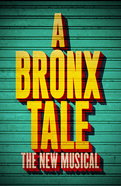A Bronx Tale Scribe on Chazz Palminteri on His Mantra, the 'Door Test' and the Difference Between Amateurs and Pros

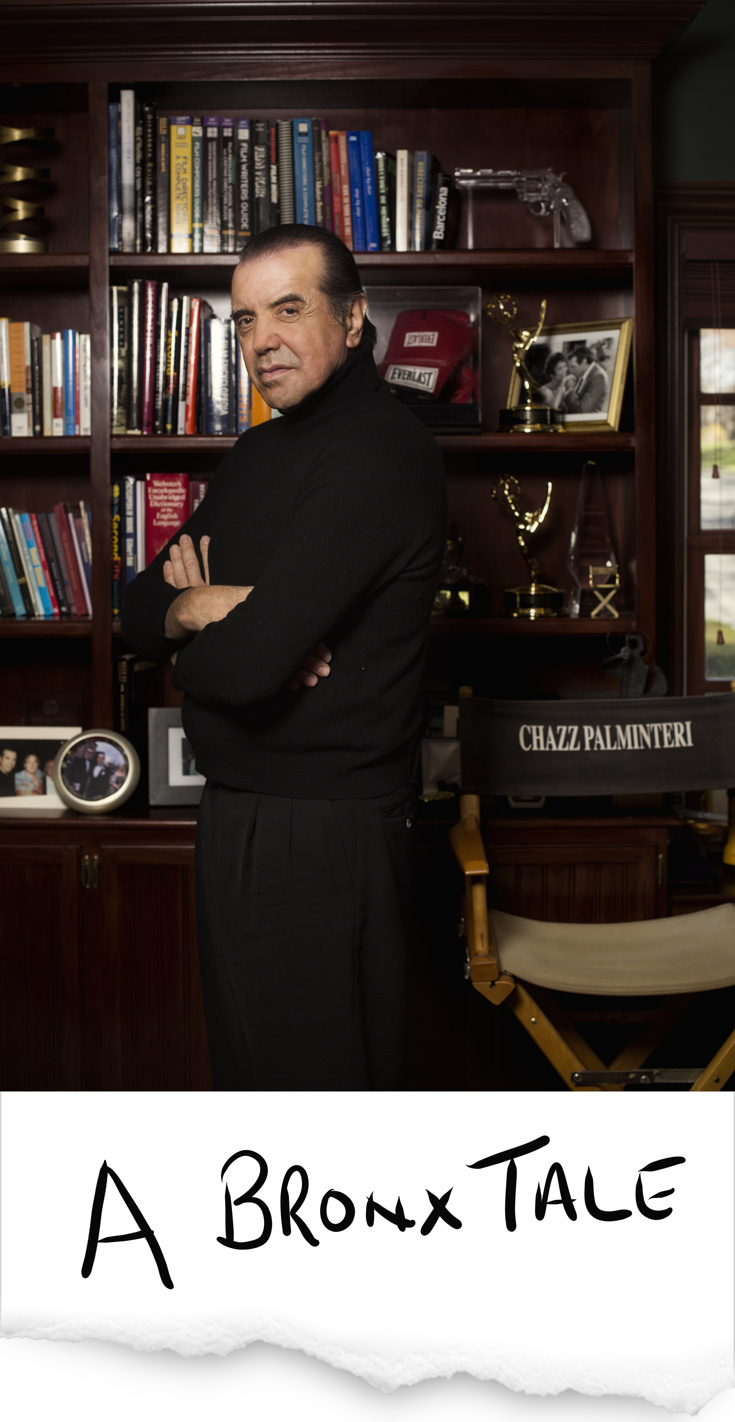
(Photo: Cailin McNaney)
Bronx-born Chazz Palminteri is most known for his work as an actor in such films as The Usual Suspects, Bullets Over Broadway (for which he earned an Oscar nomination), Analyze This, Hurlyburly and more. He wrote and began performing his solo show A Bronx Tale in 1989. The autobiographical show, which depicts the tough neighborhood of his childhood, garnered accolades and a successful off-Broadway run. He went on to write the screenplay and co-star in the screen adaptation of in 1993. As the musical version of A Bronx Tale readied for opening night, Palminteri graciously welcomed Broadway.com to his sprawling home in Westchester to share memories, talk about his writing process and offer sage advice.
What is the first thing you do when you sit down to write?
I get comfortable in my chair. I have these zero gravity chairs, so I can really feel comfortable. I'm always excited to write; I love writing. A lot of people know me as an actor, but I've written a lot of things. I’ve done rewrites and movies, but the real stuff that I love is the original stuff—my movies or plays. You don't remember the actors who did Shakespeare, but you remember the play. So to me, the play lives on forever.
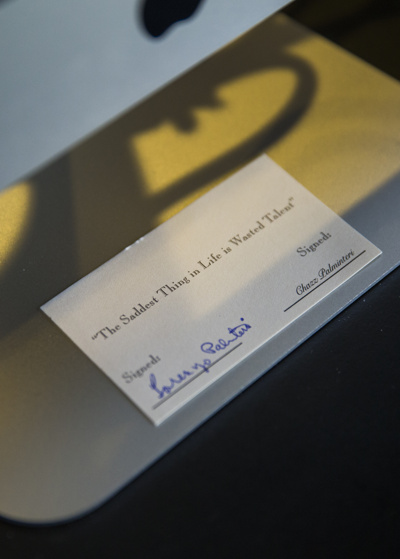
What inspired A Bronx Tale?
What made me really write it was desperation. I lost my job as a doorman in L.A. I only had a couple hundred dollars in the bank left. I didn't know what to do. Do I go home to New York? Do I stay here [in Los Angeles]? I came home and that card was there. I remember I had it with a magnet on the refrigerator and it said, "The saddest thing in life is wasted talent." My father wrote that down for me when I was nine years old after I saw this killing. He actually wrote it because this guy Billy Bello, who was a boxer, died of an overdose. My father never forgot that—he was very upset by that. And he said, “Promise me you won't waste your life. Billy had so much talent, and you have so much talent.” That was the card I looked at it was on the refrigerator, and I said, "Well, if they won't give me a great part, then I'll write one myself." I went to Thrifty drugstore, I got five tabs of yellow paper, and I started writing about this killing that I saw as a young boy and the influence that these wise guys had on me and the influence that my father had on me.
What play changed your life?

Has turning A Bronx Tale into a musical opened your eyes to anything in the material?
It was great to do the musical because there were things that I could never put in the one-man show or the movie. I was able to flesh out the story and really talk about my dad more. My father was a bus driver, and he loved to sing and loved to play the sax—he had dreams, so I was able to talk about that. And I was so blessed with [the creative team and producers]. Nobody does a musical by themselves, whoever says that is crazy.
What was your writing process for A Bronx Tale?
I just started writing. I'd do it seven, eight hours a day. I'd go to my theater workshop at Theatre West, which is a great place for actors to work. I perform 10 minutes on Monday nights, see how that went and keep four minutes. The next Monday, I had another 10 minutes, and I kept doing it. In almost a year, I had a 90-minute one-man show that was workshopped and tested with a live audience. Sometimes you have to take that anger—other people, they'll take drugs or do something stupid—I took the anger and made something positive. I think that's the key.
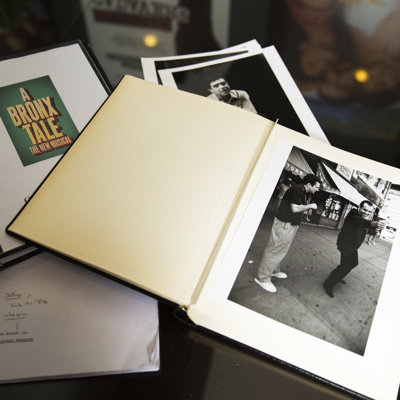
What essential items do you like to have on hand when you write?
I have photos. I took my son to my old apartment in the Bronx maybe 10 years ago—he's 21 now. And I showed them where I lived the apartment and where I grew up. Obviously, he was born here, so to see that he was like,” Wow Dad, that's pretty small!” But he was very sweet. [The photos] remind me where I'm from and what I had to do to get here. I have the card—my father's card that he signed—on my desk that says, "The saddest thing in life is wasted talent." I have pictures of my family, and it reminds me of who I'm working for. When I leave this earth, which will happen—it happens to everyone, that's a guarantee. I want people to say, “He left something behind that's valuable.” That's important to me. There are only really two things you can leave behind: art and children. So, I want to leave good kids, and I want to leave good art.
Name a writer who inspired you.

What's the best advice you've ever received about writing?
If you want to be a writer, then you have to write. You have to be disciplined. You have to treat it like a job. You can't say I'm only going to write when I'm inspired. I learned to fight through it. and the best advice I ever got was from Dr. Phil Stutz, who was one of the great psychiatrists. He wrote a book called The Tools. He told me the only difference between a professional writer and an amateur is that an amateur writes garbage get demoralized and stops. A professional writes garbage and keeps on going. I never forgot that. So, writing is just rewriting. Don't be afraid to write garbage.
What’s the origin of the “door test”?
I wish I could say I came up with that, but I didn't. It was something that when we were very young, we would talk about. It was like a folklore thing we would talk about: If a girl lifts up the button, she's a keeper. I guess I was just the first one lucky enough to put it in a movie. I thought about it for years, and when I wrote Bronx Tale, I thought, “Wow, that's a great way to say she's a great woman.” I always believed you only get three great women in your lifetime. How many times do you fall in love in your life? Twice? Maybe three times. I always thought that would be a great thing to say, so it kind of all just came together.
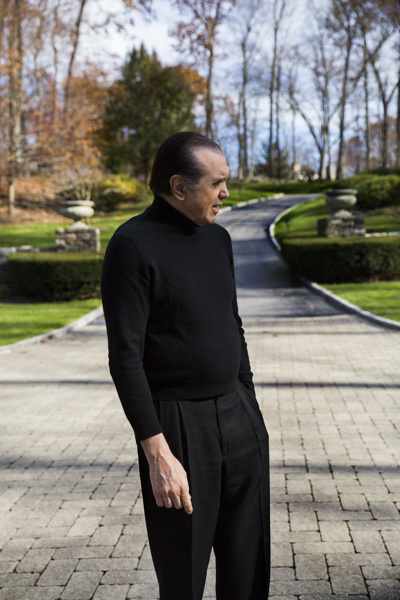
What is your advice for aspiring writers?
I know this sounds cliché, but it’s to write. Just write something. No actor no director no studio head, no one could be hired, nothing can happen until you have the script. The script is the gold. Until you write the script, nothing happens. It's all talk. So I say to all aspiring writers—whether it is a play a movie, TV show—you have to write it. You have to finish it and then see what happens.
What's your favorite line in A Bronx Tale?

